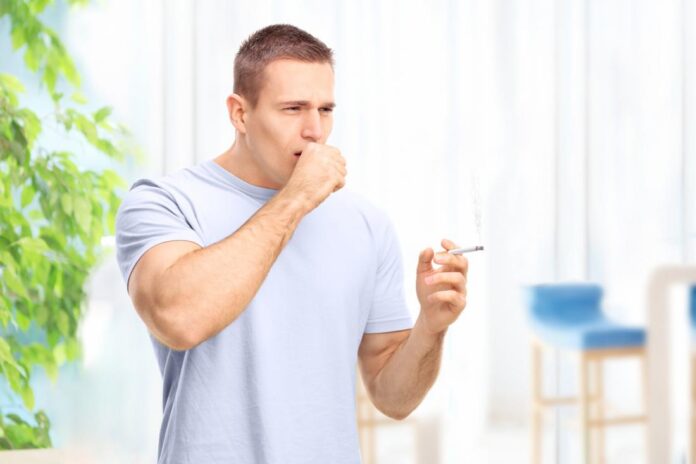If you’re smoking and coughing frequently, chances are you’ve been trying to cover it up with cough drops or by taking a break from smoking. What you may not know is that coughing is a symptom of lung cancer, one of the leading causes of cancer-related deaths in the United States.
Treating smoker’s cough is all about getting to the root of the problem. When the cause of chronic cough is lung cancer, the outlook isn’t good. In this blog, we’ll tell you everything you need to know about smoker’s cough and what you can do to get Cough Relief from symptoms and complications.
How Is Smoker’s Cough Treated?
Smoker’s cough is a chronic lung disease caused by smoking. It can be difficult to diagnose and treat, but there are several effective options. The primary treatment is avoidance of tobacco smoke, but this may not be possible for some individuals. Other treatments include cough drops, lozenges, salt water gargles, and regular exercise. These can help relieve symptoms and help prevent the cough from becoming chronic.
Bronchodilators and corticosteroids may also be prescribed by a doctor if these treatments do not help. In some cases, surgery may be required to correct airway abnormalities or lung cancer. Regular medical check-ups are essential to track the effectiveness of any treatment and ensure the cough does not become chronic.
What Are the Symptoms of Smoker’s Cough?
-Smoker’s cough can produce phlegm and a sore throat.
– It may produce a coarse, rattling sound in the throat when breathing.
– People with smoker’s cough may experience shortness of breath, chest pain, and a hoarse voice.
– They may also experience persistent cough, increased mucus production, and phlegm-choking.
– Most people with smoker’s cough up sputum. This is a clear mucous fluid that is produced as part of the cough mechanism. It may or may not contain blood or infection.
– If someone experiences any of the symptoms of smoker’s cough, it’s important to seek immediate medical care. You could be suffering from lung cancer or other lung disease.
What Causes Smoker’s Cough?
– Smoking is the primary cause of smoker’s cough, according to the Australian Government’s Department of Health. Smoking cigarettes can damage the airway and lead to smoking-related cough, asthma, chronic obstructive pulmonary disease (COPD), bronchitis, and lung cancer.
– Smokers are more likely to develop smoking-related cough, asthma, chronic obstructive pulmonary disease (COPD), bronchitis, and lung cancer because of smoking tobacco.
– Symptoms of smoker’s cough may include phlegm production and crackling sounds in the chest. These symptoms typically occur within a few days of smoking tobacco and can last for several weeks.
– Alternatively, occasionally smoking can cause smoker’s cough without any symptoms at all. Smoking cigarettes has been linked to smoking-related coughs in teens and young adults. This symptom is most common among people who smoke cigarettes for years.
– Treatment for smoker’s cough may involve medications, breathing exercises, and quitting smoking. You should seek medical attention if your cough doesn’t improve or if it occurs repeatedly or with blood-streaked mucus or mucus that is green or yellow in color.
– Medical checkups are important for smokers as they could differentiate between other types of coughs and smoker’s coughs.
Are There Any Complications Associated with Smoker’s Cough?
– Smoker’s cough can cause potential complications such as throat damage, hoarse voice, increased risk of infection, and lung cancer.
– Long-term smoking can cause toxic chemicals to build up in the lungs and airways, leading to other conditions. These include asthma and chronic bronchitis, which can be more severe among smokers. Itching and irritation in the airway can also be a complication of smoker’s cough.
– Smoking increases the risk of lung cancer by raising chronic inflammation and promoting chronic lung disease. Smokers with chronic lung disease are more likely to develop lung cancer compared with nonsmokers.
– Regular medical check-ups are important for smokers to differentiate a smoker’s cough from other lung conditions such as bronchitis or pneumonia. The best approach is to get checked by a medical professional if you experience persistent cough or mucus production.
FAQS:
What is the link between smoking and coughing?
Coughing is a very common symptom of smoking, and the reason for this is due to the cilia in the lungs being damaged and paralyzed by the chemicals in cigarette smoke. This can lead to a build-up of mucus, which can cause coughing. When you quit smoking, the cilia start to function again, which can cause the mucus to be expelled and cough less. In addition, smoking can increase your risk of pneumonia, a lung infection with symptoms including coughing, fever and difficulty breathing. Furthermore, smoking can also increase the risk of conditions such as emphysema, which can be exacerbated by pneumonia.
What are some of the symptoms of a cough caused by smoking?
Smokers cough up phlegm, wheezing, and chest pain as symptoms of the disease. Phlegm production is the strongest predictor of lung cancer. A smoker’s cough may also cause a sore throat.
How can I reduce the risk of coughing from smoking?
There are a few things that you can do to reduce the risk of coughing from smoking. First of all, avoid coffee and alcohol as they both act as irritants that can make your cough worse. Secondly, exercise for 30 minutes per day to help loosen up mucus and cough it up. Thirdly, drink plenty of water to help thin mucus in the throat and lungs. Finally, raise your head while sleeping to prevent mucus from collecting in the throat.
Conclusion
Smoking has been linked to lung cancer, chronic obstructive pulmonary disease (COPD), emphysema, and other respiratory problems. If you’re coughing up mucus or short of breath, see your doctor as soon as possible. In addition to antibiotics, best wet cough medicine such as Mucosolvan cough syrups, Mucosolvan LA tablets may help relieve your cough. A cough-sensation questionnaire and coughing exercise can also help make the diagnosis.
Treatment for smoker’s cough is usually a combination of medication and rest. With treatment, most smokers get better within a few weeks. However, some lung damage may persist even after smoker’s cough symptoms improve. Knowing the signs and symptoms of smoker’s cough can help you recognize the cough early and get prompt medical attention.








































